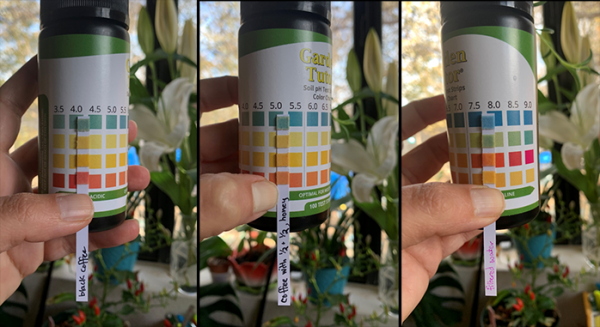November 14, 2020
Compost Spent Coffee Grounds Before Using Them on Your Soil
Question:
Can I discard spent coffee grounds in my houseplant pots?
- T. Dominguez, Santa Fe
Answer:
Sure you can, but I don’t exactly recommend it. Putting the grounds directly on houseplant soil might not pose a problem, but it’s hard to be sure. Research on the composition and chemistry of coffee grounds has shown wide variability. Some of this variability stems from differences between species in the Coffea genus grown for commercial production—most commonly either Coffea arabica or Coffea canephora (syn. C. robusta). And then there are many varieties and cultivars too. Plus, the darkness of the roast affects the grounds’ pH, with lighter roasts tending to be more acidic, but not uniformly so…more on this later.
While it is hard to find published research results on how spent coffee grounds affect the soil when applied to houseplants, there has been much more research on applying coffee grounds directly to outdoor soil and using them as a composting ingredient.
In a fact sheet entitled “Using Coffee Grounds in Gardens and Landscapes” by Washington State University Extension Urban Horticulturist Dr. Chalker-Scott, she answers the question: Can coffee grounds help my plants? “Yes. When they are used properly, coffee grounds supply nutrients and provide other benefits that increase plant growth (Yamane et al. 2014). In general, only composted coffee grounds should be worked in as a soil amendment, while either fresh or composted grounds can be used in a mulch layer. Fresh grounds are more likely to be phytotoxic (Wakasawa et al. 1998), so keeping them away from direct contact with desirable plant roots is recommended. Don’t use coffee grounds in areas where you are growing plants from seed. Reduced seed germination and plant growth of many crop and ornamental species has been observed in experiments using coffee grounds either as an amendment or a mulch (Nagaoka et al. 1996; Wakasawa et al. 1998).” Find a direct link to this article (with all of the full references) on my Desert Blooms blog.

I was surprised to read this warning in another part of that article: “Avoid adding coffee grounds to vermicomposting bins; they can injure or kill earthworms in these confined areas.” I immediately called my mother in South Carolina to ask if she uses coffee grounds in her composting worm bins. She was a bit surprised and explained that she started adding them a few months ago, but more recently backed off when she noticed many of the worms were dying. Hopefully, the problem has been solved, but we can’t be sure the culprit was the coffee.
Here are some great NMSU Cooperative Extension Service resources for composting in New Mexico:
- Bernalillo County Extension Master Composter Program
- Guide H-110: Backyard Composting
- Guide H-164: Vermicomposting
Now back to the acidity of coffee. This morning I tested the pH of my coffee (the liquid, not the grounds) before and after adding cream and honey. You know, #research. Materials included home-grade pH test strips sold for soil analysis, light roast coffee (species unknown), honey from a grower in Bosque Farms, and more half and half than I normally admit. Results: The pH of black coffee was close to 4.0, and after adding copious cream and a reasonable amount of honey it went up to around 5.5. Because pH scale is logarithmic, the black coffee was about 32 times more acidic than the way I like to drink it. A more robust study would have included both technical and biological replicates of each treatment. Biological replicates would have involved separately brewing multiple cups and testing each one. Technical replicates would mean using multiple pH test strips on each coffee sample. Alas, I drank it too fast for any sort of replication. I also tested my filtered tap water, and, similar to other times I’ve checked, the pH was around 7.5–8.0. Formal conclusions: 1) The pH test strips are pretty; 2) my tap water, like many in New Mexico, is alkaline; and 3) I love coffee almost as much as I love my job.
Marisa Y. Thompson, PhD, is the Extension Horticulture Specialist, in the Department of Extension Plant Sciences at the New Mexico State University Los Lunas Agricultural Science Center, email: desertblooms@nmsu.edu, office: 505-865-7340, ext. 113.
Links:
For more gardening information, visit the NMSU Extension Horticulture page at Desert Blooms and the NMSU Horticulture Publications page.
Send gardening questions to Southwest Yard and Garden - Attn: Dr. Marisa Thompson at desertblooms@nmsu.edu, or at the Desert Blooms Facebook page.
Please copy your County Extension Agent and indicate your county of residence when you submit your question!